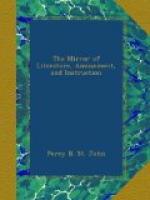“For a wound which caused deafness, twenty-five shillings.
“To lame the shoulder, divide the chine bone, cut off the thumb, pierce the diaphragm, or to tear off the hair and fracture the skull, was each punished by a fine of twenty shillings.
“For cutting off the little finger, eleven shillings.
“For cutting off the great toe, or for tearing off the hair entirely, ten shillings.
“For piercing the nose, nine shillings.
“For cutting off the fore finger, eight shillings.
“For cutting off the gold-finger, for every wound in the thigh, for wounding the ear, for piercing both cheeks, for cutting either nostril, for each of the front teeth, for breaking the jaw bone, for breaking an arm, six shillings.
“For seizing the hair so as to hurt the bone, for the loss of either of the eye teeth, or the middle finger, four shillings.
“For pulling the hair so that the bone become visible, for piercing the ear or one cheek, for cutting off the thumb nail, for the first double tooth, for wounding the nose with the fist, for wounding the elbow, for breaking a rib, or for wounding the vertebrae, three shillings.
“For every nail (probably of the fingers) and for every tooth beyond the first double tooth, one shilling.
“For seizing the hair, fifty scoettas.
“For the nail of the great toe, thirty scoettas.
“For every other nail, ten scoettas.”
W.A.R.
* * * * *
THE COSMOPOLITE.
* * * * *
THE POETRY OF ANCIENT DAYS.
(For the Mirror.)
Little Jack Horner, sat in a corner,
Eating a Christmas pie,
He pulled out a plum with his finger and
thumb,
And said what a good boy am
I.
Of all the poems that delight our infancy, there is no one perhaps which makes a more lasting impression on the memory and the imagination, than the preceding. The name of its author is lost in the shades of remote antiquity; and even the century when it first made its appearance, has eluded the vigilance of antiquarian research. Before entering upon its poetical merits, we must observe a striking peculiarity in the diction: there is not a single word in it, but that is of Anglo-Saxon origin, so that it may be considered as an admirable specimen of pure English, and as calculated to inspire the infant mind with a distaste for the numerous exotic terms, which, in the present age, disfigure our language. It has been well remarked in the review of that ancient poem, Jack and Jill, that the reader’s interest in the hero and heroine is not divided with subordinate characters. But the poem of Jack Horner possesses this excellence in a more eminent degree; in the former the interest, is divided between two, in the latter it is concentrated in one; and, notwithstanding the ingenuity of the reviewer, it must be confessed that so little is indicated by the poet, as to the character of Jack and Jill, that we feel no more interest in their fate, tragical as it is, than if they were designated by the letters X and Y of algebraical notoriety; or by the names of those personages, who figure in legal fictions, John Doe and Richard Roe.




